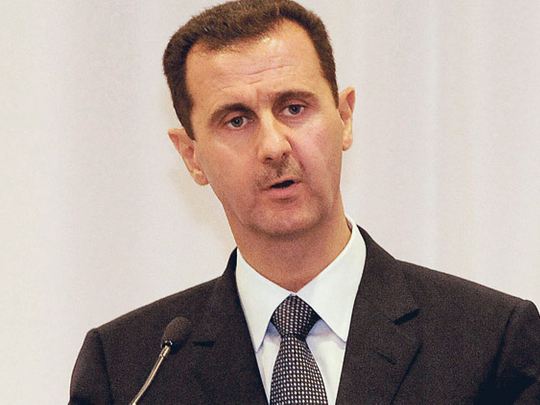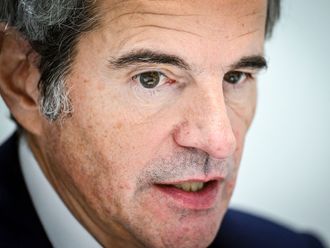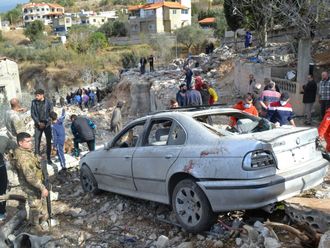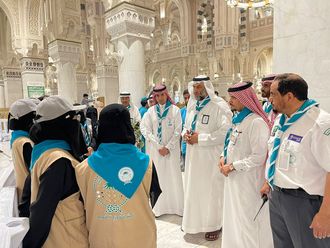
Beirut: Although Syrian President Bashar Al Assad has managed to liberalise his country's stilted economy to some extent, he has not been as successful with its politics.
His first decade in power, a milestone he will pass on Saturday, is ending more repressively than it began.
That has not deterred the West from gradually rehabilitating Syria after years of isolation imposed for its relationship with Lebanon, its backing of opponents of the US-led invasion of Iraq in 2003 and its support for Islamist groups fighting Israel.
Syria is still jailing dissidents, drawing only verbal condemnation from the United States and its European allies and silence from an Arab world where similar practices abound.
A military court gave 79-year-old lawyer Haitham Al Maleh a three-year jail term last week for "weakening national morale". He was arrested last year after renewing calls to dismantle the 1963 emergency law that bans all opposition to the Baath Party.
In June, another lawyer was jailed on the same charges and a writer was re-arrested a day after completing 2 1/2 years in prison. Five opposition figures were freed after serving similar sentences. Former parliamentarian Riad Seif remains behind bars.
"Assad is sending a message that he doesn't care about human rights and political reforms in Syria and that he doesn't think the international community cares or will sanction him on that," said Nadim Houry, Human Rights Watch Director in Beirut.
Damascus has acquired a glossy appearance in the last 10 years, with a sprinkling of boutique hotels, chic cafes and shopping malls, along with private banks and construction projects.
But critics say modern liberalisation of the country has mainly benefited a narrow class of well-connected businessmen, while corruption remains pervasive. They question whether Syria's economic reforms can succeed without broader political and judicial reforms.
Reliance on security services
While some public criticism of economic policy is tolerated, much remains unchanged, including the security system Assad inherited from his formidable father, the late Hafez Al Assad.
"The government undoubtedly assumes that by keeping a tight rein on the people and maintaining clear red lines, it will face less trouble in the long run and fewer people will go to jail," said Joshua Landis, a Syria expert at Oklahoma University.
"Syria is surrounded by countries that have been plagued by long civil wars and tough insurgencies," he said, citing Iraq, Lebanon, Turkey and the Israeli-Palestinian conflict. "Syrian security has concluded that it cannot risk relaxing controls."
After taking over in July 2000, Assad freed some political detainees and allowed debate on democracy and reform to flourish, only to crush the ‘Damascus spring’ movement a few months later.
Another crackdown scooped up opposition intellectuals who tried to revive the movement after an international outcry over the assassination of Lebanese statesman Rafik Al Hariri forced Syria to pull its troops out of Lebanon in 2005. Damascus denied any role in his killing, which a United Nations tribunal is currently investigating.
Assad, who survived intense US pressure under ex-President George W. Bush, has emerged unbowed and feeling vindicated.
"The international pressure on Syria was never about human rights," Houry said. "In the Bush years there was clearly more criticism of its human rights record, but it was often part of a campaign that had broader interests and the Syrians knew that."
Upswing in Assad’s fortunes
In the last two years, Assad has forged closer ties with Iran, Turkey and Qatar, mended fences with Saudi Arabia and revived much of Syria's influence in Lebanon, keeping links with Hezbollah there and with the Palestinian Hamas movement.
US President Barack Obama has sought to engage Syria and enlist its help in stabilising Iraq and in regional peace moves, although Congress has yet to confirm an ambassador to Damascus.
Regardless of which American President is in power, Assad seems in no hurry to ease up on his domestic critics, who pose no credible challenge to his now well-entrenched authority.
"In reality, Syria's touch regarding human rights is not a function of administrations in Washington," Murhaf Jouejati, a scholar at the Middle East Institute in the US capital, said.
"Rather, Syria's organising principle seems to be: it's better to be feared than to be loved. More economic space will not necessarily translate into improved human rights."
Some room may open up for private social organisations. Assad's wife Asma presided over Syria's first international conference of such ‘civil society’ groups in January.
But a human rights defender in Damascus, who asked not to be identified, has said only apolitical groups could operate right now.
Syria, according to the media watchdog ‘Reporters without Borders’, is among the world's most repressive countries for internet users. Skype, Facebook and YouTube are all banned and many bloggers and journalists have been detained. The country ranked 165th out of 175 countries in the group's Press Freedom Index in 2009.
"The Syrian regime argues that it provides precious security and stability and that it has protected its minorities and secular freedoms better then other Arab states," Landis said.
"It is hard to know whether these arguments are real and based on a judicious assessment of local realities, or simply self-serving justifications for clinging to power."











